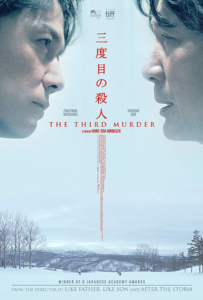Exploring the meaning of justice, “The Third Murder” is an engrossing crime/legal procedural.
 “The Third Murder” begins with a hand-me-down criminal case. Attorney Shigemori (Masaharu Fukuyama) is appointed to represent a robbery-murder defendant, Misumi (Kôji Yakusho), who is alleged to have killed his boss. The case is very simple, Misumi admitted killing his boss and then burning his body. Open and shut. The motive was money. But after an initial meeting with his client, Shigemori decides to dig deeper. After all, the prosecutor is pursuing the death penalty.
“The Third Murder” begins with a hand-me-down criminal case. Attorney Shigemori (Masaharu Fukuyama) is appointed to represent a robbery-murder defendant, Misumi (Kôji Yakusho), who is alleged to have killed his boss. The case is very simple, Misumi admitted killing his boss and then burning his body. Open and shut. The motive was money. But after an initial meeting with his client, Shigemori decides to dig deeper. After all, the prosecutor is pursuing the death penalty.
The players here are operating within a justice system seemingly unconcerned with truth, or, at least, the right kind of truth. Shigemori has a job to do, and like any good criminal defense attorney, keeping the truth out of the courtroom is just a part of the normal operating procedure. There’s truth and then there’s the whole truth. It’s very  complicated. The system is a defective beast, and only by understanding its imperfections can one effectively escape.
complicated. The system is a defective beast, and only by understanding its imperfections can one effectively escape.
In Misumi’s case, Shigemori is tasked with saving him from the gallows. To do this, he must craft a narrative that will sway the jury and the Judge. And in forming that story, truth might be the first casualty.
Writer/director Hirokazu Koreeda (“After the Storm”) approaches the subject delicately—incrementally adopting a deliberate pace that focuses closely on tiny details, while retaining the tension of a fascinating mystery. This isn’t a thriller, much of the action is in the dialogue between a frustrating and guarded client and an attorney, who may or may not care.

The handsome, tall, thin Fukuyama is perfect as the passionless lawyer, who starts the case with preconceived notions. He infuses Shigemori with an elitist vibe, but the change in his personality, subtle, at first, bubbles up in a number of ways. Fukuyama begins all spit-and-polish and then descends into a rumpled mess. And Koreeda drives the conflicted nature of the character home with clever visual cues placing Shigemori at a crossroads.

As the necessary foil, Yakusho plays off Fukuyama’s reserve and proper, buttoned-up persona. The film’s best scenes have the two men sparing with one another. And Yakusho melts into the role of the faceless everyman. He has to hide truth with dialogue but has to convey something completely different with his body language. It’s an impressive performance.
 While watching “The Third Murder,” I kept thinking about Akira Kurosawa’s “High and Low.” The great Kurosawa film from 1963, which leans more on thriller elements, is admittedly different in structure than “The Third Murder.” But both films have the same foreboding tone and feel. Naturally, the final scene in “High and Low” had to have had an influence on Koreeda (who like Kurasawa was born in Tokyo)—the similarities are clear. And it is a testament to the subtle power of “The Third Murder” that comparisons to the work of the Japanese master are made.
While watching “The Third Murder,” I kept thinking about Akira Kurosawa’s “High and Low.” The great Kurosawa film from 1963, which leans more on thriller elements, is admittedly different in structure than “The Third Murder.” But both films have the same foreboding tone and feel. Naturally, the final scene in “High and Low” had to have had an influence on Koreeda (who like Kurasawa was born in Tokyo)—the similarities are clear. And it is a testament to the subtle power of “The Third Murder” that comparisons to the work of the Japanese master are made.
“The Third Murder” creatively examines how truth bends in favor of judicial economy. It’s a tricky bit of thoughtful filmmaking from an emerging Japanese master.
